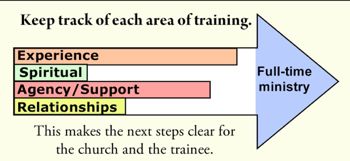
Train Leaders for Ministry
The process of caring for those who have committed themselves
to full-time service. 
Rev. Paul J. Bucknell
Train up! | Support God's Work | Leader's Responsibility
Confirmation of the Call | Training Process | General Plan | Specific Plan
Too Many People | Summary
Purchase e-Book (pdf, epub, mobi)
The General Plan of Development
Purpose
The General Plan is part six of a series on Train Up New Leaders for Ministry which builds confidence in the mentor's ability to train a person from their local church sensing a calling into ministry.
Training need not be so mystical as it seems. I suggest having both a general and a specific plan.
We need ageneraland aspecific plan. |
The general plan helps us to get an overall picture of what needs to be done through the training process.
It doesn’t mean we need to do it all, but we do need to understand the process and end goal if we are going to help them. We will be a director of sorts.
There are several ways to understand the overall training process. The most important thing to remember is that we are trying to present a complete man or woman in Christ. God will gift them.
God has given them His Spirit. We are shapers to help conform them so that they can excel in their lives and service. In fact, this is true for all the people in our congregation.
"For the equipping of the saints for the work of service, to the building up of the body of Christ; until we all attain to the unity of the faith, and of the knowledge of the Son of God, to a mature man, to the measure of the stature which belongs to the fullness of Christ" (Ephesians 4:12-13).
Check out these further resources on Ephesians 4.
1. The Means God enables His people (Ephesians 4:11)
The Apostle Paul has mentioned that a full-time worker requires significant growth in a number of specific areas (see 1 Timothy 3:1-7).  It is interesting that gifts and certain ministry skills are not mentioned there. Evidently, these things are not as important as the issues of godly character. 
It is interesting that gifts and certain ministry skills are not mentioned there. Evidently, these things are not as important as the issues of godly character. 
Character, skill and willingness to conduct proper relationships with others is essential to a well-functioning servant of God. We must not neglect what God emphasizes.
Our chart focuses on four areas needing development for going into ministry. You might choose to differently name or shape them. That is fine.
Experience/training
Identify and gain the essential skills and knowledge one needs to enter full-time ministry and to serve in the area most burdened. Other training comes along while in the path of service.
Character/spiritual
Acquire the moral character and effective spiritual disciplines to maintain a close and intimate relationship with the Lord and proper attitudes toward others.
Agency/support
Make the proper contacts with a mission or denominational agency so that requirements are understood and met in a timely manner, including the raising of needed support (prayer and financial).
Church relationships
Carry on good and proper relationships with those in the home church, making sure clear communication is occurring.
These four items are designed for a person planning to be a full-time missionary. They differ somewhat for those going into the pastorate, teaching or other parachurch ministries but largely overlap.
If any training in any one of these four areas is lacking, then the person in training will often get confused and make wrong decisions. And so will the church!
The person concerned will need to grow in knowledge, skills, and relationships and through this process make important good decisions. When we share these four areas of development that full-time workers need, then they will also know that they will be expected to grow in these four areas.
Clear communication eliminates many misunderstandings and clarifies individual expectations. This, in turn, provides a framework upon which the trainer and trainee expend their time and efforts.
Some people are more mature and need less training. Everyone needs training, but this training is received in many ways. A good family behind the scenes helps establish the character quality needed for service. Those without a godly family background will need to learn personal skills and character qualities in different ways.
They perhaps need more opportunity to mature as they serve. Other individuals need more training. That is fine. Whatever the Lord wants should be done.Just don’t forget to work with the individual and see how he really measures up.
That is fine. Whatever the Lord wants should be done.Just don’t forget to work with the individual and see how he really measures up.
If we bypass a person because he is, for instance, the pastor’s son, then we will tend to neglect proper training which will have long-lasting negative consequences. Don’t be partial but faithful.
More information on these four areas and helpful starter questions for the individual to think about can be found in the book, “Take Your Next Step into Ministry.”
A Leader’s Project
-
For each individual that is seeking full-time service, buy a folder supplied with five pages. One page has general information about the individual. The other four pages will resemble the four points mentioned above (or however you divide them).
-
Track a person’s progression in each area. Personally, I would make this an open folder for the person to see. Open it right in front of him. Give him a copy. It will remind him of the inward and outward steps needed to confirm his call to the ministry.
A pastor, elder or missionary chairman can oversee this process. We only ask that he would be a mature man in the faith. A woman should not oversee a man’s development.
Next => The Specific Plan










